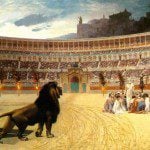
(Wikimedia Commons public domain photograph)
In 622, the Prophet and his followers emigrated from Mecca to Yathrib. This emigration, or hijra, as it is called in Arabic, now serves to mark the beginning of the Islamic calendar. Notice that the calendar does not start with the Prophet’s birth, nor with the beginning of the Qur’anic revelation, but with the emigration to Yathrib. Why? Because Muhammad went from being merely a prophet, a voice crying in the wilderness, to being the leader of a fairly sizeable community by the standards of seventh-century Arabia. He thus became a political figure, as well as a prophet.
As the nature of Muhammad’s responsibilities changed, so did the nature of the revelations he received. The suras received in Mecca had been short, with short verses and strong rhymes. They had been obscure, apocalyptic, oracular. In Yathrib, they became more concerned with legal or legislative matters, with the issues that arise in governing a community. Their form changed, too. They tended to be less poetic, more prosaic. The revelations or chapters were longer, and the individual verses within them were also longer. One verse from the second chapter of the Qur’an will demonstrate quite clearly the way Medinan revelations—as they are called, for reasons which will appear in a moment—differ from Meccan revelations. It will be noted that this represents simply one verse. (Compare it with, say, the entire hundredth chapter, cited above, which contains fully eleven verses within its brief compass.)
Believers, when you contract a debt for a fixed period, put it in writing. Let a scribe write it down for you with fairness; no scribe should refuse to write as God has taught him. Therefore let him write; and let the debtor dictate, fearing God his Lord and not diminishing the sum he owes. If the debtor be a feebleminded or ignorant person, or one who cannot dictate, let his guardian dictate for him in fairness. Call in two male witnesses from among you, but if two men cannot be found, then one man and two women whom you judge fit to act as witnesses; so that if either of them commit an error, the other will remember. Witnesses must not refuse to give evidence if called upon to do so. So do not fail to put your debts in writing, be they small or big, together with the date of payment. This is more just in the sight of God; it ensures accuracy in testifying and is the best way to remove all doubt. But if the transaction in hand be a bargain concluded on the spot, it is no offence for you if you do not commit it to writing. See that witnesses are present when you barter with one another, and let no harm be done to either scribe or witness. If you harm them you shall commit a transgression. Have fear of God, who teaches you; He has knowledge of all things. (2:282)
It would be wrong, however, to suggest that the old power and beauty had gone out of the Qur’an by the Medinan period. Passages like the so-called “Light Verse,” which some modern commentators believe refers to the lighted altar of a seventh-century Christian church, conclusively demonstrate that this was not so:
God is the Light of the heavens and the earth;
the likeness of His Light is as a niche
wherein is a lamp
(the lamp in a glass,
the glass as it were a glittering star)
kindled from a Blessed Tree,
an olive that is neither of the East nor of the West
whose oil well-nigh would shine, even if no fire touched it;
Light upon Light;
(God guides to His Light whom He will.)[1]
[1] 24:35; Arberry.












